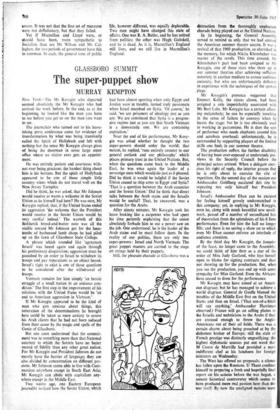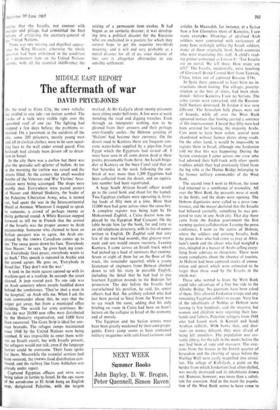The super-puppet show
GLASSBORO SUMMIT MURRAY KEMPTON
New York—The Mr Kosygin who departed seemed absolutely the Mr Kosygin who had arrived the week before. In the end, as at the beginning, he looked like the man you have to see before you get to see the man you want to see.
The journalists who turned out to his leave- taking press conference came for evidence of transformation by what was being transiently called the Spirit of Hollybush and left with nothing but the sense Mr Kosygin always gives of being the doorman in some large outer office where no visitor ever gets an appoint- ment.
He was entirely patient and courteous with- out ever being gracious; the hardest thing about him is his bottom. But the spirit of Hollybush appeared to be one of those simple little country wines which do not travel well on the New Jersey Turnpike.
Did he think, he was asked, that Mr Johnson would receive as warm a welcome in the Soviet Union as he himself had here? He was sure, Mr Kosygin replied, that, if the United States ended its aggression 'the welcome that the President would receive in the Soviet Union would be very cordial indeed.' The warmth of this Bolshevik bread-and-butter note was all the visible reward Mr Johnson got for the heca- tombs of barbecued lamb chops he had piled up on the lawn of Glassboro State College.
A phrase which sounded like 'agreyeson Israeli' was heard again and again through his preliminary disquisition; aggression must be punished by an order to Israel to withdraw its troops and pay reparationi as an object lesson.
Israel's right to exist is one of those questions to be considered after the withdrawal of troops.
Vietnam remains for him simply 'an heroic struggle of a small nation in an arduous con- dition.' The first step in the improvement of his relations with the United States would be 'an end to American aggression in Vietnam.'
If Mr Kosygin appeared to be the kind of man who gets anxious about things, this reiteration of the determinations he brought here could be taken as mere anxiety to assure his Arab clients that he had not been seduced from their cause by the magic and spells of the Genie of Glassboro. '
But one soon understood that the commit- ment was to something more than that fraternal courtesy to which the Soviets have no better record of fidelity than any other great nation. For Mr Kosygin and President Johnson do not merely have the barrier of language; they are also divided by concentration on different pas- sions. Mr Johnson seems able to live with Com- munism anywhere except in South East Asia; Mr Kosygin can abide with capitalism any- where except in the Middle East.
Two weeks ago, one Eastern European journalist noticed how the Soviet Union, which had been almost sporting when only Egypt and Jordan were in trouble, turned truly passionate when Israel marched on Syria. 'Of course,' he said, 'we are prisoners of ideology just as you are. We are convinced that Syria is a progres- sive regime just as you are that South Vietnam is a democratic one. We are containing capitalism.'
Near the end of his performance, Mr Kosy- gin was asked whether he thought the two super-powers should order the world; that notion, he replied, 'runs entirely counter to our general outlook and our philosophy' which places primary trust in the United Nations. But, when the questions came back to the Middle East, he was once again the leader of a sovereign state which would do just as it pleased. Did he think it would be helpful if the Soviet Union ceased to ship arms to Egypt and Syria? 'That is a question between the Arab countries and the Soviet Union.' Did he think that direct talks between the Arab states and the Israelis would be useful? That, he answered, was a question for the Arabs.
After ninety minutes, Mr Kosygin took his leave looking like a carpenter who had spent his time patiently explaining that the union absolutely forbade him to use a power saw on the job. One understood; he is the leader of the Arab states and he must follow them. In the reality of our politics, there are only two super-powers: Israel and North Vietnam. The great puppet masters are carried to the stage on strings held by their puppets.
Still, the pleasant charade at Glassboro was a
distraction from the thoroughly unpleasant charade being played out at the United Nations.
In its beginning, the General Assembly served to remind us only that we had entered the American summer theatre season. It was a revival of that 1960 production, so cherished in the memory, for which Nikita Khrushchev was master of the revels. This time around, Mr Khrushchev's part had been assigned to Mr Kosygin, one of those stars who show up in our summer theatres after achieving sufficient notoriety in another medium to arouse audience curiosity, but who are unfortunately deficient in experience with the techniques of the spoken stage.
Mr Kosygin's presence suggested that Emmett Kelly, the circus clown, had been assigned a role imperishably associated with Mr Bert Lahr. Mr Kosygin has a certain affect- ing melancholy; he can be especially touching in the sense of failure he conveys when he leaves the stage; but he is too obviously used to working in pantomime. He is thus the sort of performer who needs elephants around him and acrobats overhead; unfortunately, he is surrounded by supporting players of the limited skills one finds in our summer theatre.
The production suffers the further disability of having been over-exposed at understudy pre- views in the Security Council before the principal actors arrived. When a delegate exer- cises his right of reply, the interior groans that he is only about to exercise the rite of repetition. On the second day of the session our Ambassador Goldberg escalated this rite by repeating not only himself but President Johnson.
Israel's Ambassador Eban can be excused for feeling himself grossly undermatched in this company; yet, in replying to Mr Kosygin, even he, along with much beautiful new scroll- work, passed off a number of secondhand bits of decoration from the splendours of his 6 June performance. Even for him the hall no longer fills; and there is no saving a show on to which even Mr Eban cannot enforce an interlude of audience attention.
By the third day Mr Kosygin, the founder of the feast, no longer came to the Assembly: we could think of him then as a star of the order of Miss Judy Garland, who lays herself open to blame for signing contracts and then not showing up for the production. But, when you see the production, you end up with some sympathy for Miss Garland. Even the Africans have ceased to dress for the performance.
Mr Kosygin may have aimed at an Ameri- can disgrace; but he has managed to achieve a world disgrace. General de Gaulle blamed the troubles of the Middle East first on the United States and then on Israel. (`That son-of-a-bitch will say anything,' Ambassador Harriman observed.) France will go on selling planes to the Israelis and technicians to the Arabs if they are aroused enough to throw the Anglo- Americans out of their oil fields. There was a certain charm about being preached at by the dishonest broker of Europe; still the state of French prestige was distinctly ungratifying; the highest diplomatic sources put out word that M Couve de Murville had provided a most indifferent chef at his luncheon for foreign ministers on Wednesday.
The West has offered no proposals; a silence has fallen upon the Russians. U Thant confines himself to preparing a fresh and hopefully final report on his actions before the war began, a remote historical controversy which seems to have produced more real passion here than the war itself. By now the unaligned nations were There was one moving and dignified appear- ance by King Hussein; otherwise the whole quetion had been embalmed in the condition of a permanent item on the United Nations ,,,enda, with all the essential indifference the seizing of a permanent item eVokes. It had begun as an aesthetic disaster; it was develop- ing into a political disaster for the Russians who are enchained in a posture for which they cannot hope to get the requisite two-thirds majority; and it will end very probably as a moral disaster for all of us, since rhetoric of this sort is altogether obstructive to any sensible settlement.











































 Previous page
Previous page